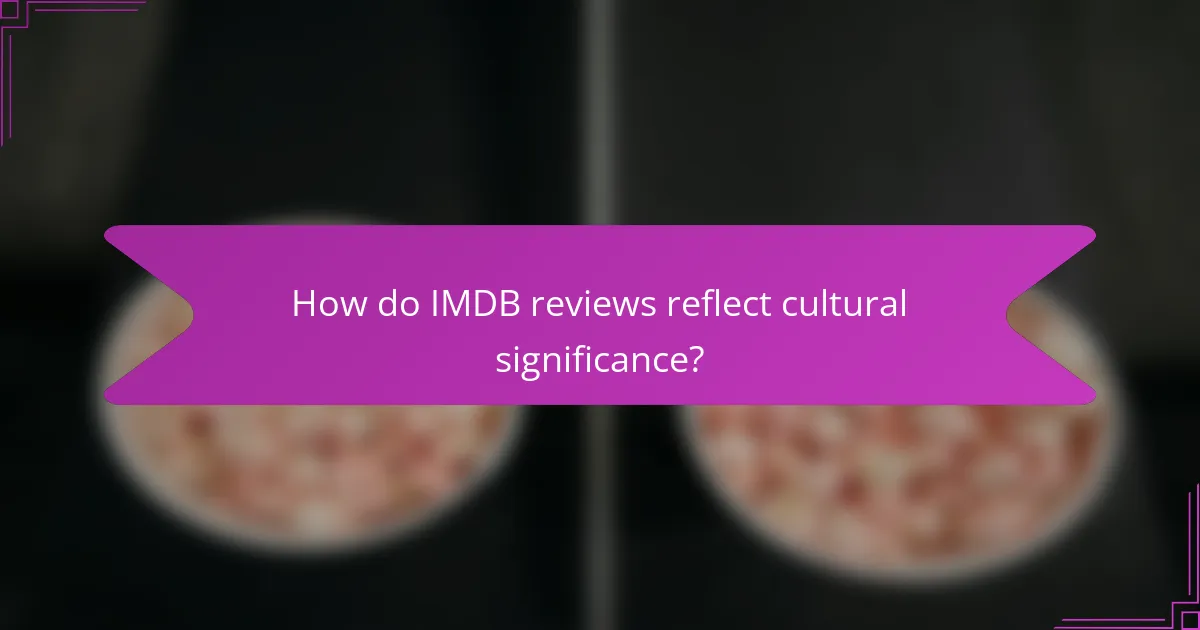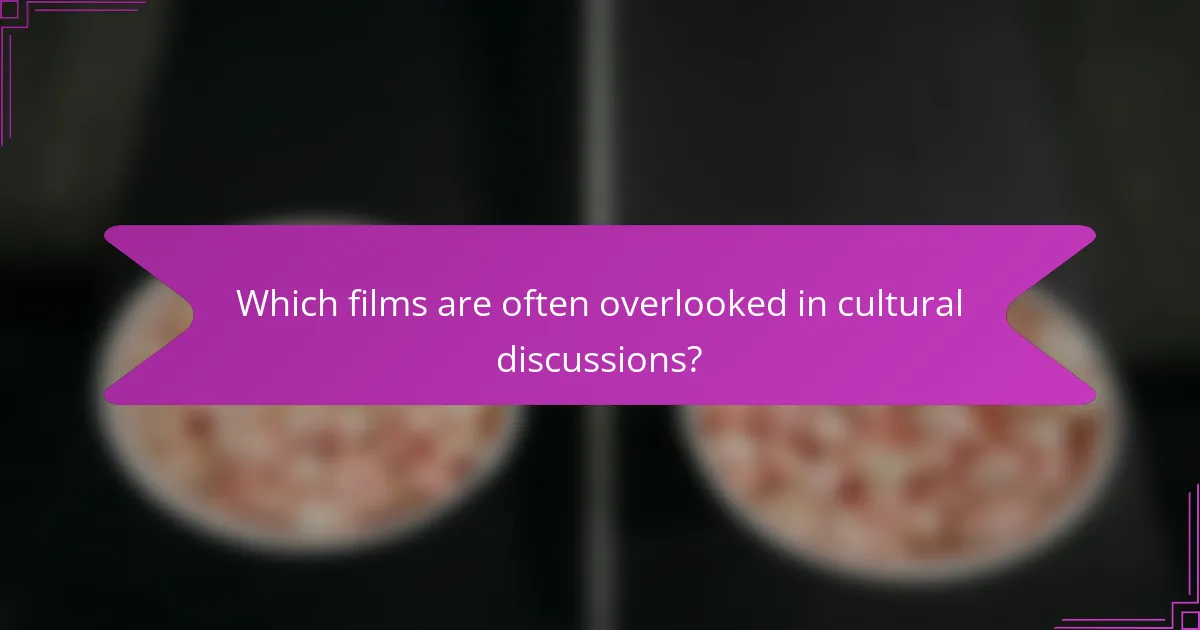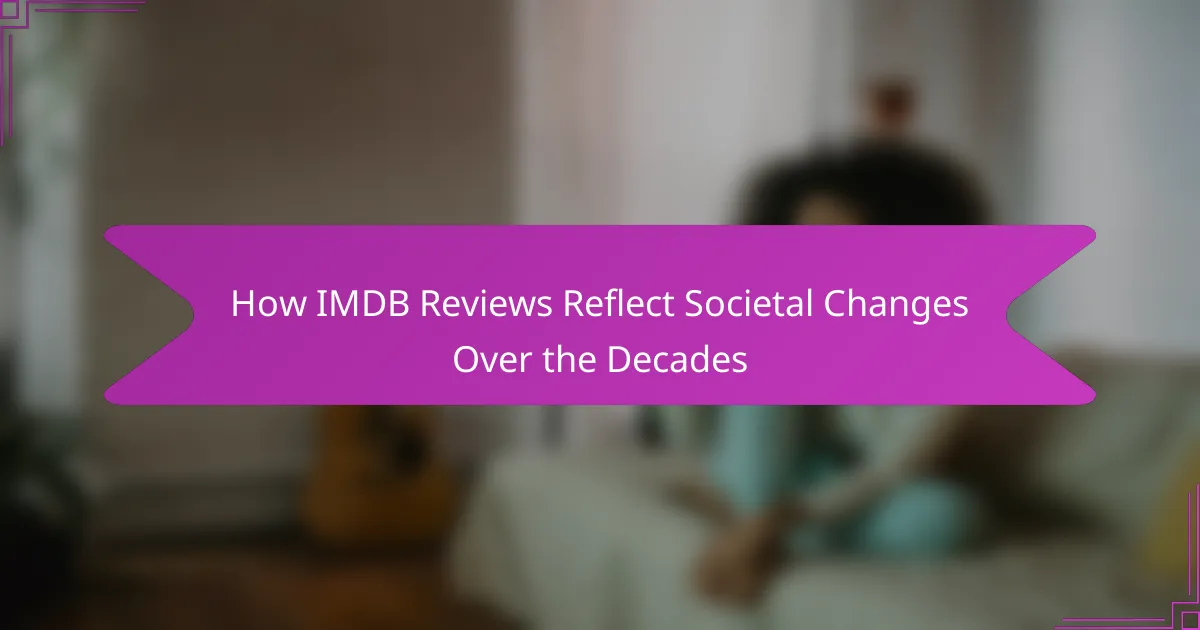Exploring the best IMDB movie reviews for films that changed the cultural landscape reveals the profound influence these works have had on societal norms and cinematic storytelling. These reviews capture audience sentiments and reflect broader cultural themes, showcasing how films resonate with viewers and contribute to ongoing societal conversations.

What are the best IMDB movie reviews for films that changed the cultural landscape?
The best IMDB movie reviews for films that changed the cultural landscape highlight how these films influenced societal norms, storytelling techniques, and representation in cinema. Reviews often discuss the lasting effects these films have had on audiences and the film industry as a whole.
The Godfather (1972) – Cultural Impact
The Godfather is widely regarded as a cornerstone of American cinema, reshaping the portrayal of organized crime and family dynamics on screen. Its complex characters and moral ambiguity set a new standard for storytelling, influencing countless films and television series that followed.
Reviews often emphasize the film’s exploration of power, loyalty, and the American Dream, resonating with audiences across generations. The Godfather’s iconic scenes and quotes have permeated popular culture, making it a reference point in discussions about film and storytelling.
Pulp Fiction (1994) – Narrative Innovation
Pulp Fiction revolutionized narrative structure in film with its non-linear storytelling and eclectic dialogue. The film’s unique approach to intertwining multiple storylines challenged conventional filmmaking and inspired a wave of independent cinema in the 1990s.
IMDB reviews frequently highlight how Quentin Tarantino’s script and direction created a fresh cinematic language, blending genres and elevating character development. Its impact can be seen in the way modern films experiment with narrative techniques, making it a significant reference in film studies.
Black Panther (2018) – Representation in Film
Black Panther marked a pivotal moment in Hollywood by showcasing a predominantly Black cast and a story centered on African culture. The film’s success challenged industry norms and opened doors for more diverse storytelling in mainstream cinema.
Reviews on IMDB often focus on how Black Panther not only entertained but also sparked conversations about representation and identity. Its cultural significance is reflected in its ability to inspire audiences and filmmakers alike, emphasizing the importance of diverse narratives in film.

How do IMDB reviews reflect cultural significance?
IMDB reviews serve as a barometer for a film’s cultural impact, showcasing audience sentiments and societal shifts. They highlight how films resonate with viewers, reflecting broader cultural themes and values at the time of release.
User Ratings and Trends
User ratings on IMDB often reveal trends in public opinion and cultural preferences. For instance, films that tackle social issues or represent diverse perspectives frequently garner higher ratings, indicating a shift towards inclusivity in cinema. Tracking these ratings over time can show how cultural attitudes evolve, with certain genres or themes gaining popularity as societal norms change.
To analyze trends effectively, consider looking at the ratings of films released during significant cultural events. For example, movies released during movements like #MeToo or Black Lives Matter often receive heightened attention and ratings, reflecting their relevance to contemporary issues.
Critical Acclaim vs. Audience Reception
There can be a notable disparity between critical acclaim and audience reception on IMDB. Critics may praise a film for its artistic merit, while audiences might rate it based on entertainment value or relatability. This divergence often highlights cultural divides, where critics and general viewers prioritize different aspects of storytelling.
For instance, a film that is technically brilliant but thematically challenging may receive high scores from critics but lower ratings from general audiences. Understanding these differences can provide insights into what aspects of a film resonate with the public and reflect cultural values at a given time.

What criteria should be used to evaluate impactful films?
To evaluate impactful films, consider their cultural relevance and innovative storytelling techniques. These criteria help identify how a film resonates with audiences and contributes to societal conversations.
Cultural Relevance
Cultural relevance refers to a film’s ability to reflect, challenge, or shape societal norms and values. Films that address pressing social issues or highlight underrepresented voices often gain significant attention and influence.
For example, movies like “Get Out” and “Black Panther” have sparked discussions on race and representation, making them pivotal in contemporary culture. When assessing cultural relevance, consider the film’s themes, the context of its release, and its impact on public discourse.
Innovative Storytelling
Innovative storytelling encompasses unique narrative structures, character development, and visual techniques that push the boundaries of traditional filmmaking. Films that experiment with these elements often leave a lasting impression and inspire future works.
Consider films like “Pulp Fiction,” which employs a non-linear narrative, or “Inception,” known for its complex layers of reality. When evaluating innovative storytelling, look for originality in plot, character arcs, and the use of technology or cinematography that enhances the viewer’s experience.

Which films are often overlooked in cultural discussions?
Several films have significantly impacted cultural conversations yet remain underappreciated. These movies often challenge societal norms and provoke thought, making them essential to understanding cultural shifts.
Do the Right Thing (1989) – Racial Tensions
“Do the Right Thing” explores racial tensions in a Brooklyn neighborhood on a hot summer day. The film highlights the complexities of race relations, showcasing how small incidents can escalate into larger conflicts.
Key characters represent various perspectives, making it a multifaceted examination of prejudice and community dynamics. The film encourages viewers to reflect on their own biases and the societal structures that perpetuate inequality.
Fight Club (1999) – Masculinity and Consumerism
“Fight Club” critiques modern masculinity and consumer culture through the lens of an unnamed protagonist who forms an underground fight club. The film questions the impact of materialism on identity and self-worth.
By portraying the struggle against societal expectations, it resonates with audiences feeling disillusioned by consumerism. The narrative serves as a call to reclaim personal agency and redefine masculinity beyond traditional norms.

How can IMDB reviews guide film selection for cultural studies?
IMDB reviews can significantly aid in selecting films for cultural studies by highlighting viewer sentiments and thematic elements. Analyzing these reviews provides insights into how films resonate with audiences and reflect societal values.
Identifying Key Themes
Key themes in films often emerge through viewer reviews, revealing cultural narratives and societal issues. Look for recurring topics such as identity, conflict, and social justice, which can indicate a film’s impact on cultural discourse.
For example, films like “Get Out” and “Black Panther” are frequently discussed in terms of race relations and representation. By examining the reviews, one can identify how these themes are perceived and their relevance to contemporary discussions.
Understanding Audience Perspectives
Audience perspectives in IMDB reviews provide a window into how different demographics interpret films. Pay attention to the diversity of opinions, as they can highlight varying cultural backgrounds and experiences that shape viewer reactions.
For instance, a film like “Parasite” may receive praise for its commentary on class disparity, but reviews might differ based on cultural context. Analyzing these perspectives can enrich the understanding of a film’s cultural significance and its reception across different audiences.

What emerging trends are influencing cultural films today?
Emerging trends such as diversity in storytelling and the rise of streaming platforms are significantly shaping cultural films today. These trends reflect changing societal values and enhance accessibility, allowing a broader range of voices and narratives to be represented in cinema.
Diversity in Storytelling
Diversity in storytelling is becoming a crucial aspect of cultural films, as filmmakers increasingly focus on underrepresented voices and experiences. This shift not only enriches the narrative landscape but also resonates with audiences seeking authentic representation.
Films that highlight diverse cultures, gender identities, and social issues often receive critical acclaim and commercial success. Examples include movies like “Black Panther” and “Parasite,” which challenge traditional narratives and broaden the scope of mainstream cinema.
Streaming Platforms and Accessibility
The rise of streaming platforms has transformed how cultural films are distributed and consumed, making them more accessible to global audiences. Services like Netflix, Amazon Prime, and Hulu offer a vast array of films that might not have received theatrical releases, allowing viewers to explore diverse genres and stories from the comfort of their homes.
These platforms often invest in original content that reflects cultural shifts, providing opportunities for filmmakers from various backgrounds. As a result, audiences can discover films that resonate with their experiences, further influencing cultural conversations and trends.



